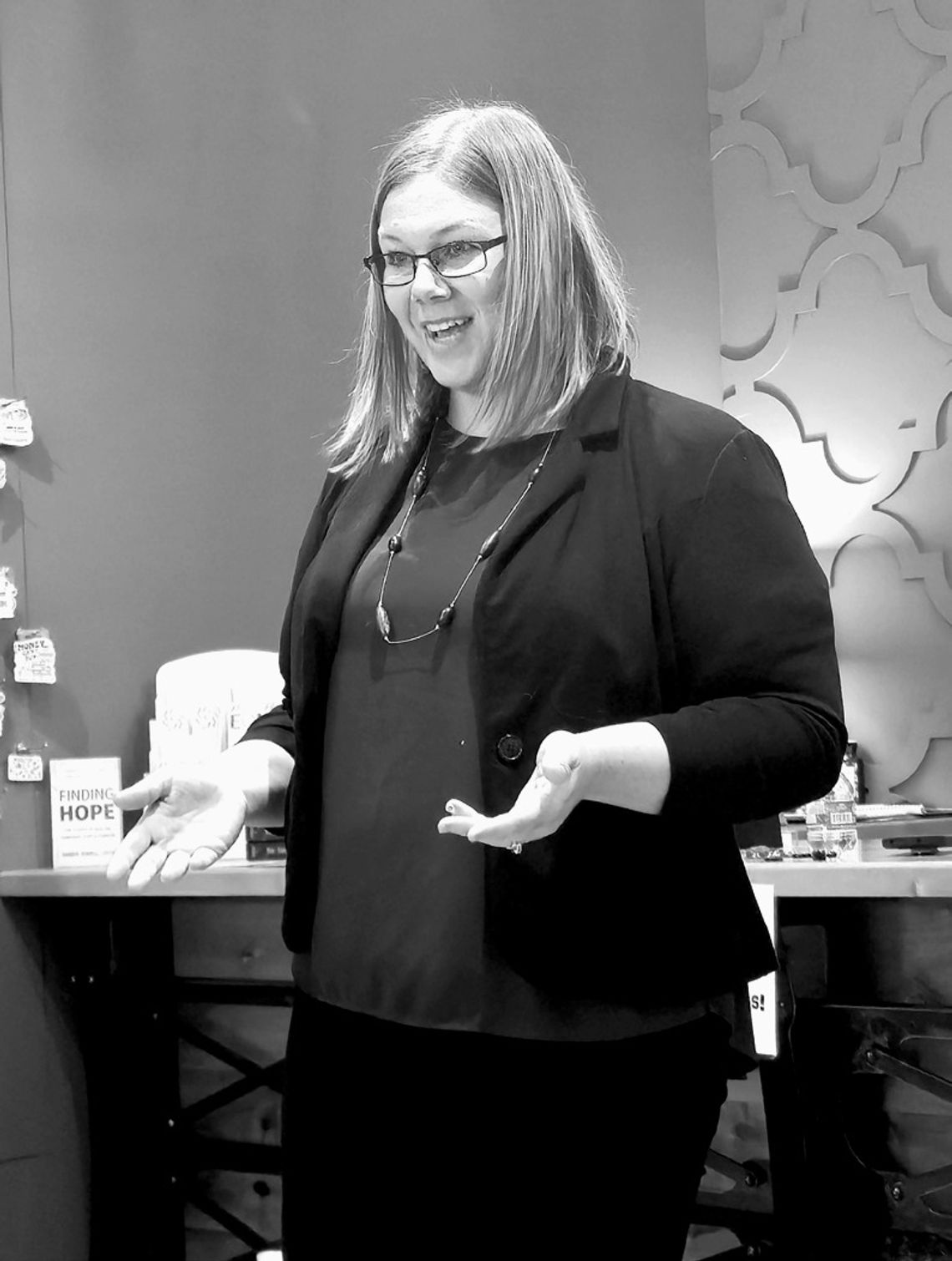HUMBOLDT — Bridge Street Books hosted its first-ever author event on Sunday, Aug. 24.
Amber Jewell, a licensed specialist clinical social worker, published “Finding Hope: The 12 Keys to Healing Hardship, Hurt, & Sorrow” in 2021.
Bridge Street Books opened at the end of May. Owner Sarah Hart said that she enjoyed Jewell’s joyous energy and said that what Jewell shares is great information for everyone to have.
Under her bubbly demeanor, many would not guess the tumultuous childhood that Jewell had. Jewell said she suffered extreme child abuse and neglect, and also has longterm trauma from her childhood.
“This book was written for people who have hardships; for people who have stress; for people who have anxiety,” Jewell said.
According to Jewell, 20% of the population is identified as having anxiety or depression disorders. However, she said 70% of individuals report having some type of anxiety.
She said the point of this book is for others to find hope in the face of life’s challenges.
“Because we’re going to have challenges no matter what. Some are natural life events, some are not,” Jewell said, “But we can find hope.”
Jewell defines hope as the belief that there is something better capable of happening.
“There is hope in all of our lives, way more than we give credit for it,” Jewell said.
“And it’s really a beautiful thing to keep on our focus and on our mind.”
Jewell said that as a child, she never would have gotten up to speak in front of other people, as she felt insufficient. Jewell spoke of her personal childhood experiences to attendees, but noted that in her book, she doesn’t discuss many details of her story.
“But I do talk about it, because it is an important part of us,” Jewell said. “We all have these different parts of who we are and what we’ve been through. What’s really amazing is the hope that we can see in all of those aspects of it.”
Part of Jewell’s story includes being in and out of her biological father’s home, foster care, group homes, and even a brief period of living with her biological mother in Kentucky. With her father, she was not allowed to use the same bathroom, share meals with, or spend time with the other members of her household. With her mother, she was subject to emotional abuse due to the mental illnesses of her caregivers. While she acknowledges that her parents had their own traumas, she didn’t understand that as a child.
“The younger version of ourselves see things so differently; give yourself grace on that,” Jewell said.
She notes that experiencing abuse and trauma showed her that life is tough, which is why the first part of the book is about accepting the fact that life is inherently challenging.
“Life is tough, and so are you,” Jewell said. “ Don’t put a ‘but’ in there, don’t be a butt to yourself. Just say ‘life is tough and so am I’ in these challenges.”
The second chapter of the book is about how “Tough is tolerable.” Jewell highlighted that by enduring tough times, individuals build resilience.
She notes that many individuals in her life offered her hope, including cafeteria workers and church groups who fed her.
“That was a person who didn’t know me, didn’t know my story, but saw me as a person, worthy; and they gave me hope,” Jewell said. “You may not think that what you do is enough, but you’re not responsible for deciding that; the person who is receiving it is, and it may surprise you.”
Jewell said the friends she made also gave her hope. She notes that there is a section of the book dedicated
to “finding your people.” “Loving people unconditionally is really powerful,”
Jewell said.
Jewell said “your people” will love you, and also hold you accountable. They will let you fail and grow, but support you through those challenges.
A powerful moment in Jewell’s life is when her adoptive mother, a woman from her church, invited her to join their family when she was a teenager.
“She said to me, ‘We want all of you: the good, the bad; we want all of you,’” Jewell said.
And while she said she wished that was the happy ending, Jewell said life isn’t like that.
“The truth of the matter is, it doesn’t stop,” Jewell said. “We just get stronger.”
Jewell said she began experiencing seizures before her freshman year of college, due to a traumatic brain injury she sustained at the age of four. In the face of this challenge, she got married, had brain surgery to decrease seizure activity, and finished her undergraduate degree. After the surgery, Jewell said she had to relearn how to walk, talk, and write. She said this forced her to accept both her strengths and her weaknesses.
Lastly, Jewell discussed the topic of forgiveness. She said forgiveness can come and go over time.
“Forgiveness doesn’t okaying that behavior, but it is accepting that that behavior happened and that we can do something about it,” Jewell said. “It’s hard, but it is one of the most powerful ways to find hope.”
Jewell said she worked on the book for 30 minutes each night for over a month to complete her first draft. It was recommended to her to picture a person she was writing to. At the time, Jewell said she knew a student in foster care, and she said she wrote the book thinking of them.
Jewell highlighted that for every 10th book she sells, a copy of the book is donated to a foster home.
“There is so much good in the darkness. We may need to dig it out, but it is worth the work,” Jewell said.







